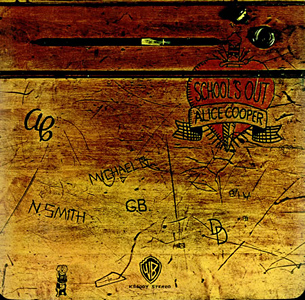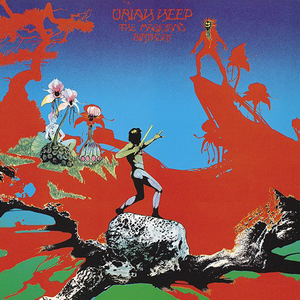
Simon and Garfunkel's Greatest Hits is the first compilation album from Simon & Garfunkel, which was released on June 14, 1972, two years after Simon & Garfunkel had parted ways.

Barclay James Harvest were an English progressive rock band, which following a split in 1998 now exists as two successor bands. They were founded in Oldham, in September 1966 by bassist/vocalist Les Holroyd, guitarist/vocalist John Lees, drummer/percussionist Mel Pritchard (1948–2004), and keyboardist/vocalist Stuart "Woolly" Wolstenholme (1947–2010).

School's Out is the fifth studio album by American rock band Alice Cooper, released in June 1972. Following on from the success of Killer, School's Out reached No. 2 on the US Billboard 200 chart and No. 1 on the Canadian RPM 100 Top Albums chart, holding the top position for four weeks. The single "School's Out" reached No. 7 on the Billboard Hot 100, No. 3 on the Canadian RPM Top Singles Chart and went to No. 1 in the UK Singles Chart.

Too Low for Zero is the seventeenth studio album by English musician Elton John, released in 1983. The album marked a comeback for John, whose previous four albums had failed to yield many enduring international hit singles, and had disappointing sales compared to his string of hit records released during the first half of the 1970s.

East of the Sun, West of the Moon is the fourth studio album by Norwegian band A-ha, released on 27 October 1990 by Warner Bros. Records. Named after a Norwegian fairy tale, the album was something of a departure from the band's earlier radio-friendly sound to a darker, moodier tone. It peaked at number one in the band's native Norway and reached top 20 in various European countries and Japan. It was co-produced by Ian Stanley, formerly of the band Tears for Fears.

The Magician's Birthday is the fifth studio album by English rock band Uriah Heep, released in November 1972 by Bronze Records in the UK and Mercury Records in the US. The concept was "based loosely on a short story" written by keyboardist Ken Hensley in June and July 1972.

Wonderworld is the seventh studio album by English rock band Uriah Heep, released in 1974 by Bronze Records in the UK and Warner Bros. Records in the US. Wonderworld was the last Uriah Heep album to feature bass player Gary Thain.

"Everything Burns" is a song by American guitarist Ben Moody and American singer Anastacia for the soundtrack to the film Fantastic Four (2005) based on the Marvel comics of the same name. Released on June 20, 2005, "Everything Burns" became a top-10 hit in five European countries, including Italy, where it peaked at number two. The song's music video, directed by Antti Jokinen, was shot on April 30 and May 1, 2005, at the Culver Studios in Los Angeles.

On the Level is the eighth studio album by English rock band Status Quo, released by Vertigo Records on 14 February 1975. The album's cover art features band members in an Ames room, and on the original vinyl release, the inner gatefold sleeve consisted of informal photos members of the group had taken of each other.

Heads or Tales is the fifth studio album by the Canadian progressive rock band Saga, released in 1983. The album was the second of the band's to be produced by Rupert Hine. Although it did not attain the same commercial success and status of the previous collaboration between the band and Hine, Worlds Apart (1981), both "The Flyer" and "Cat Walk" became respectable radio hits for the band with the album eventually securing gold status in Canada (50,000) and Germany (250,000). A third single from the album, "Scratching the Surface", became a live staple and fan favourite in the band's concert line-up during the late-1990s and 2000s as a piano solo played by Jim Gilmour during a break by the other band members. The song reached #45 in the Canadian Singles charts, April 1984.

"Sweat (A La La La La Long)" is a song by Jamaican reggae fusion band Inner Circle, released in July 1992 by Warner Records as the lead single from their twelfth album, Bad to the Bone (1992). It was written by the band's Ian and Roger Lewis, and produced by them with another band member, Touter Harvey. Song was vocalised by a past member Calton Coffie. It became a number-one hit in Belgium, Germany, Israel, the Netherlands, New Zealand, Portugal, Switzerland, and Zimbabwe. In the US, it reached numbers 16 and 12 on the Billboard Hot 100 and Cash Box Top 100. The accompanying music video, depicting the group on the beach, was directed by Mathias Julien. Australian music channel Max included "Sweat (A La La La La Long)" in their list "1000 Greatest Songs of All Time" in 2017.

"Weekend" is a song by Dutch band Earth and Fire. It was released by Earth and Fire as a single in November 1979 and reached the number one spot in the singles charts in the Netherlands, Switzerland, West Germany, Denmark and Portugal. It was written by keyboard player Gerard Koerts for the album Reality Fills Fantasy.

Stadtaffe is the first solo album by German musician Peter Fox. Released 26 September 2008, the standard version contains twelve tracks, four of which have been released as singles. Fox performed the single Schwarz zu blau at the Bundesvision Song Contest 2009 in Potsdam while representing Berlin, and won, becoming the first person to win the contest twice. The album was certified 6× platinum for shipping 1.2 million copies in Germany and is the third-most-downloaded album of all time there, selling 100,000 copies from downloads only.
"Hiroshima" is an anti-war song performed by British band Wishful Thinking, written by David Morgan and produced by Lou Reizner, which tells about the atomic bombing of Hiroshima. The track was recorded at the Chappell Recording Studios in London in 1970. It was first released in 1971 as a single from their album of the same name, but achieved commercial success only upon its re-release in 1978, when it peaked at No. 8 in West Germany, staying on the chart for 44 weeks. It was one of the best-selling singles of 1978 in West Germany.

The Montreux Album is the fifth studio album by the English rock band Smokie, released in 1978. Recorded primarily at Mountain Studios in Montreux between 6 and 24 February 1978, it was the band's last album to be made in partnership with Nicky Chinn and Mike Chapman.

"Live and Learn" is a song by American new jack swing group Joe Public, released in March 1992 by Columbia as the second single from their self-titled debut album (1992). The song was a success, peaking at number four on the US Billboard Hot 100, number three in the Netherlands and New Zealand, and number 10 in Belgium. It was ranked number 16 on Complex magazine's list of the "25 Best New Jack Swing Songs of All Time".

Greatest Hits is a compilation album by British rock band Smokie, released in April 1977. It contains all eight of the band's singles up to that date. All but one of the tracks were written by Nicky Chinn and Mike Chapman.

Trouble is the second album by the British pop group Sailor, formed in 1973 and best known in the 1970s for their hit singles "A Glass of Champagne" and "Girls, Girls, Girls", written by the group's Norwegian lead singer and 12-string guitar player, Georg Kajanus. The album reached #45 in the UK charts.

Barclay James Harvest and Other Short Stories is the third album by English progressive rock band Barclay James Harvest, released in 1971. The band has been said to be "dabbling in symphonic rock" with this album.
This is the discography of British rock band Barclay James Harvest, including its subsequent incarnations as John Lees' Barclay James Harvest and Barclay James Harvest Featuring Les Holroyd.

















